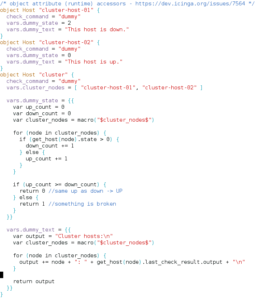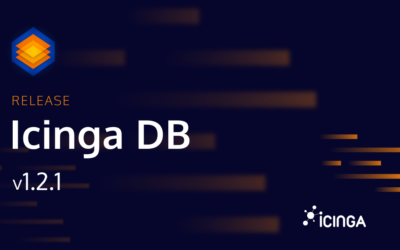You may have heard it already – 2.3 adds lots of new features, for example object attribute accessors at runtime accompanied by functions, loops, conditionals and much more. Bringing you Icinga 2 v2.3.0 also means: 660 Git commits since 2.2.0, 94 features & 127 bug fixes.
While upgrading your Icinga 2 installation, you can test-drive the new language features in the new live console online on icinga.org. Grab a coffee, check additional feature details below, switch to the Changelog and once your upgrade has finished, get to work with the all new shiny Icinga 2 v2.3.0. The online documentation is currently undergoing changes, things to note: live search and removable tables of content tab.
Conditional statements
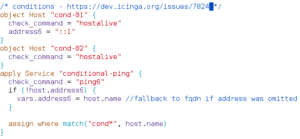
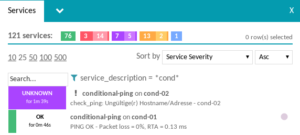 This was frequently asked in the past: “How can I inherit values from the host to the service, and leave it to a default value if not set?” Consider it done with if-then-else-if-else conditions inside the Icinga 2 configuration language. The example shows a fallback to the host’s FQDN if its address6 attribute has not been set – cool, isn’t it?
This was frequently asked in the past: “How can I inherit values from the host to the service, and leave it to a default value if not set?” Consider it done with if-then-else-if-else conditions inside the Icinga 2 configuration language. The example shows a fallback to the host’s FQDN if its address6 attribute has not been set – cool, isn’t it?
Functions – what for?
You can now define your own functions including the return keyword. That includes locally scoped variables identified by the var keyword and anonymous lambda functions too. We’ve thought about functions and their use cases for Icinga 2. One thing we came up with is the Boolean return value for set_if inside command arguments – not only a macro string value, but also nearly any condition. Same applies for command argument values. The short way of assigning return values is putting them in double curly brackets {{ …. }}.
Loops, loops, loops, …
You’ve seen for loops already inside the fancy apply for rules introduced with version 2.2. Using while and for loops including break and continue keywords has been experimental for Icinga Web 2’s Vagrant Box quite a while. In real-life scenarios you would use them in combination with functions and if-then-else conditions iterating over arrays and dictionaries defined in custom attributes.
Object attribute accessors for clustered checks
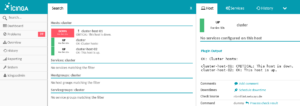
That syntax could be used for cluster checks and business processes inside Icinga 2 – we’ll tackle the dummy check problem sooner or later, promise!
Time dependent thresholds
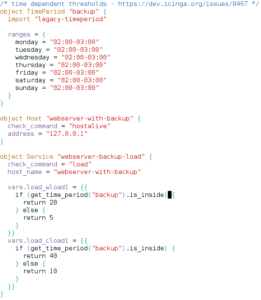
Type methods
Defined an array, but need it in a sorted manner? Remove a dictionary item inherited from a template? Split a string into parts? Not an issue anymore.
console CLI command
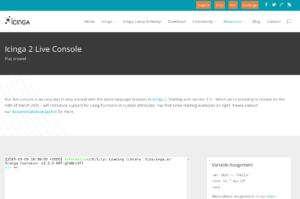
Misc features
From OpenTSDB support to ignoring soft states in dependencies. Additional ITL plugin check commands (interfacetable, IPMI, webinject, vmware_esx, local ‘nscp client’ commands for the Windows agent). Livestatus header support, improved performance and additional bygroup tables. Improved cluster stability and scalability using fewer threads for socket I/O and SNI TLS support. ‘icinga2 troubleshoot’ cli command for better community support … check the Changelog below and in the documentation for more details.
PS: I’ve uploaded the configuration samples made for this blog post into the Vagrant boxes.
2.3.0 Changelog
- Improved configuration validation
- Unnecessary escapes are no longer permitted (e.g. \’)
- Dashes are no longer permitted in identifier names (as their semantics are ambiguous)
- Unused values are detected (e.g. { “-M” })
- Validation for time ranges has been improved
- Additional validation rules for some object types (Notification and User)
- New language features
- Implement a separate type for Boolean values
- Support for user-defined functions
- Support for conditional statements (if/else)
- Support for ‘for’ and ‘while’ loops
- Support for local variables using the ‘var’ keyword
- New operators: % (modulo), ^ (xor), – (unary minus) and + (unary plus)
- Implemented prototype-based methods for most built-in types (e.g. [ 3, 2 ].sort())
- Explicit access to local and global variables using the ‘locals’ and ‘globals’ keywords
- Changed the order in which filters are evaluated for apply rules with ‘for’
- Make type objects accessible as global variables
- Support for using functions in custom attributes
- Access objects and their runtime attributes in functions (e.g. get_host(NodeName).state)
- ITL improvements
- Additional check commands were added to the ITL
- Additional arguments for existing check commands
- CLI improvements
- Add the ‘icinga2 console’ CLI command which can be used to test expressions
- Add the ‘icinga2 troubleshoot’ CLI command for collecting troubleshooting information
- Performance improvements for the ‘icinga2 node update-config’ CLI command
- Implement argument auto-completion for short options (e.g. daemon -c)
- ‘node setup’ and ‘node wizard’ create backups for existing certificate files
- Add ignore_soft_states option for Dependency object configuration
- Fewer threads are used for socket I/O
- Flapping detection for hosts and services is disabled by default
- Added support for OpenTSDB
- New Livestatus tables: hostsbygroup, servicesbygroup, servicesbyhostgroup
- Include GDB backtrace in crash reports
- Various documentation improvements
- Solved a number of issues where cluster instances would not reconnect after intermittent connection problems
- A lot of other, minor changes
- DB IDO schema upgrade to 1.13.0 required!
